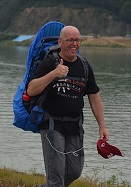 ‘I feel at home in Japan’ and ‘not a day goes past that I’m not involved with it in some away’ says this unique Sydney-sider who has visited Japan 85 times and travelled to all 47 prefectures.
‘I feel at home in Japan’ and ‘not a day goes past that I’m not involved with it in some away’ says this unique Sydney-sider who has visited Japan 85 times and travelled to all 47 prefectures.
When he speaks of his love for Japan as his ‘second home’, it is not about the places and attractions highlighted in the glossy tourist brochures. Rather his passion is about its culture and people, who include those he considers to be ‘best friends’, ‘my Japanese families’ and ‘surrogate parents’.
How did this level of commitment come about for a boy who was raised on Sydney's Lower North Shore with a father who had fought in PNG during WWII - and who left school in 1982 with the ambition of becoming a professional tennis player? During his childhood there was much enmity towards Japan; Peter had no involvement with anything Japanese apart from the Tokyo Mart grocery store that had opened near his home.
Looking back, Peter says that the tipping point was when, after playing tennis with some local Japanese ex-pats, he was intrigued enough to attend a lesson on Introductory Japanese, followed by a beer with a group of Japanese working-holiday students.
Tennis became the vehicle for the journey that has made Japan Peter’s other life passion. The two became intertwined because ‘tennis is such an incredibly popular sport in Japan’.
After leaving school, Peter’s knowledge about Japan grew through his small business of tennis coaching Japanese expat families. Continued lessons in the language helped his coaching, done in Japanese. The connections he made through coaching lead to a month-long holiday in Japan at the age of twenty and his return two years later on a 14-month professional tennis contract, when he became more immersed in the culture and established some life-long relationships.
Whilst Peter describes his career as being the result of a ‘complete fluke’, it seems that the pathway has been more a result of his hard work (‘I take on things with a gusto’), his willingness to take risks and invest himself both culturally and emotionally in Japan and the many friendships he has forged within the relationship based culture of the Japanese. In 1987 he completed a Diploma of Japanese from UTS.
Although Peter had thought he would probably marry a Japanese woman, in 1993 he married a New Zealand-born Chinese woman. In 1997 their son was born with Downs syndrome and autism. At the time he wondered how this might affect his relationship with Japan because it seemed less accepting of disability than Australia. However he says that, in hindsight, he totally underestimated the capacities of his friends as ‘when we did eventually bring our son to Japan... (sic) it was unbelievable, it was fantastic, it brings me to tears’.
Subsequently Peter has taught tennis for the Japan Downs Syndrome Association. With his first-hand experience, Peter now says: ‘One of the things I do with a passion is my work with the (Tokyo 2021)(sic) Paralympics.’ He hopes that the Paralympics will help enhance societal inclusion of persons with disability.
In 1999 their daughter was born. Shortly thereafter Peter sold his Sydney coaching business and since then his career in Sport/Japan has been on the corporate side. Although it is easy to recite Peter’s list of business achievements from his self-made beginnings to the successes of recent times, it is clear that his series of stepping-stones come from his people-skills, his openness to embrace diversity and his empathy and respect for others. And, of course, his love and respect for the Japanese culture and people which have been the common thread throughout - from his tennis business that was flooded with Japanese people to the present.
After the 2011 tsunami Peter completed the 309km Charity Walk from Fukushima City to Ofunato to raise disaster and humanitarian relief for children orphaned by the disaster. Along the route he stopped to give tennis lessons to children, some of whom had lost their parents.
Peter speaks of Japanese people with great affection. Although he is quick to state that his view of Japan is not through rose-coloured glasses, he feels passionately about their humility, resilience and sense of harmony. He enjoys their ability to sense the needs of others, ‘rather than thinking about yourself’, the stability, order and quietness of the environment and how they talk to each other (‘The culture is embedded in the language’). He explains his experience of the willingness of Japanese people to trust and go out of their way to assist others. Also how a relationship is ‘for life’. He emphasizes how he has learned ‘so much’ from his Japanese relationships.
Peter’s adult life has been profoundly influenced by his connections with Japan and his resulting true friendships. Having completed his role as General Manager, Rugby World Cup Japan 2019 with Gullivers Sport Travel Association, Peter is currently Executive Advisor to the Tokyo 2021 Olympic and Paralympic Games and an Executive Adviser with the Seven Network for the games.
After the Games he plans to trip around Japan with his son in a campervan. Although to date he has never lived in Japan for an extended period, he says ‘I move even more naturally in Japan that I do here’; it comes as no surprise that he is looking to purchase a place in the area south-east of Mt Fuji. And he still plays tennis for fitness - ‘I like to go out and go hard’.